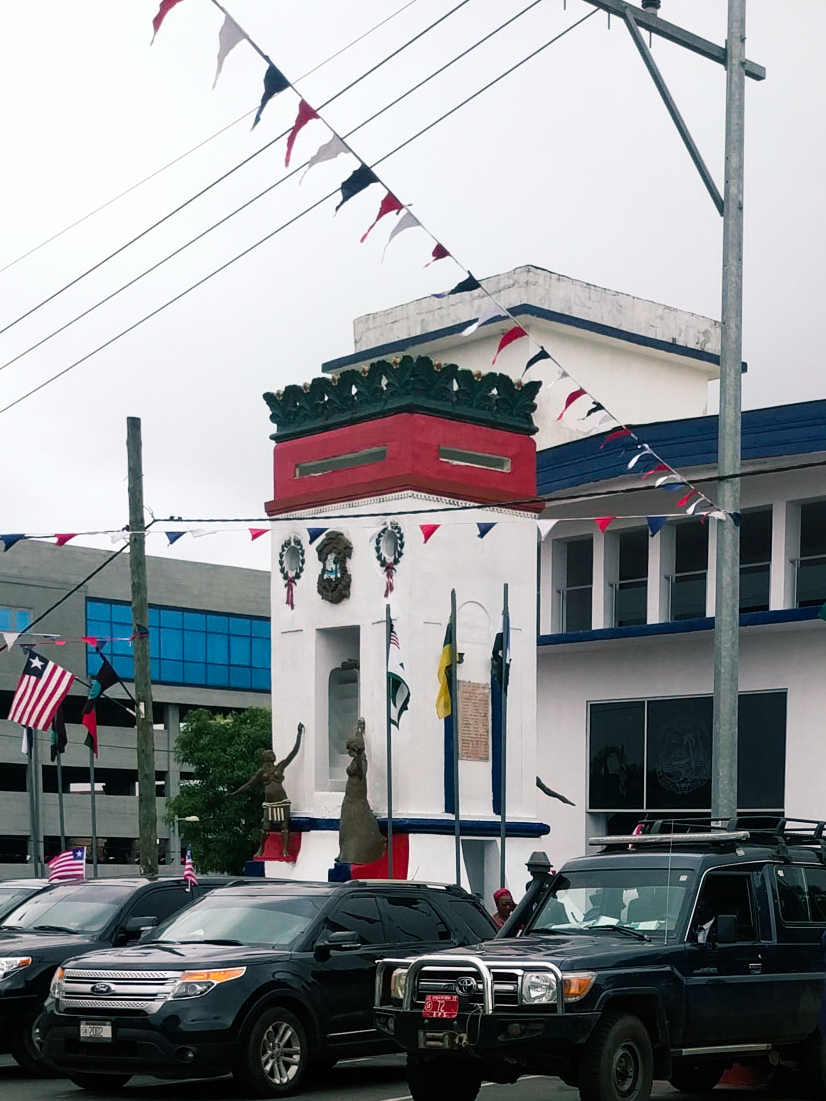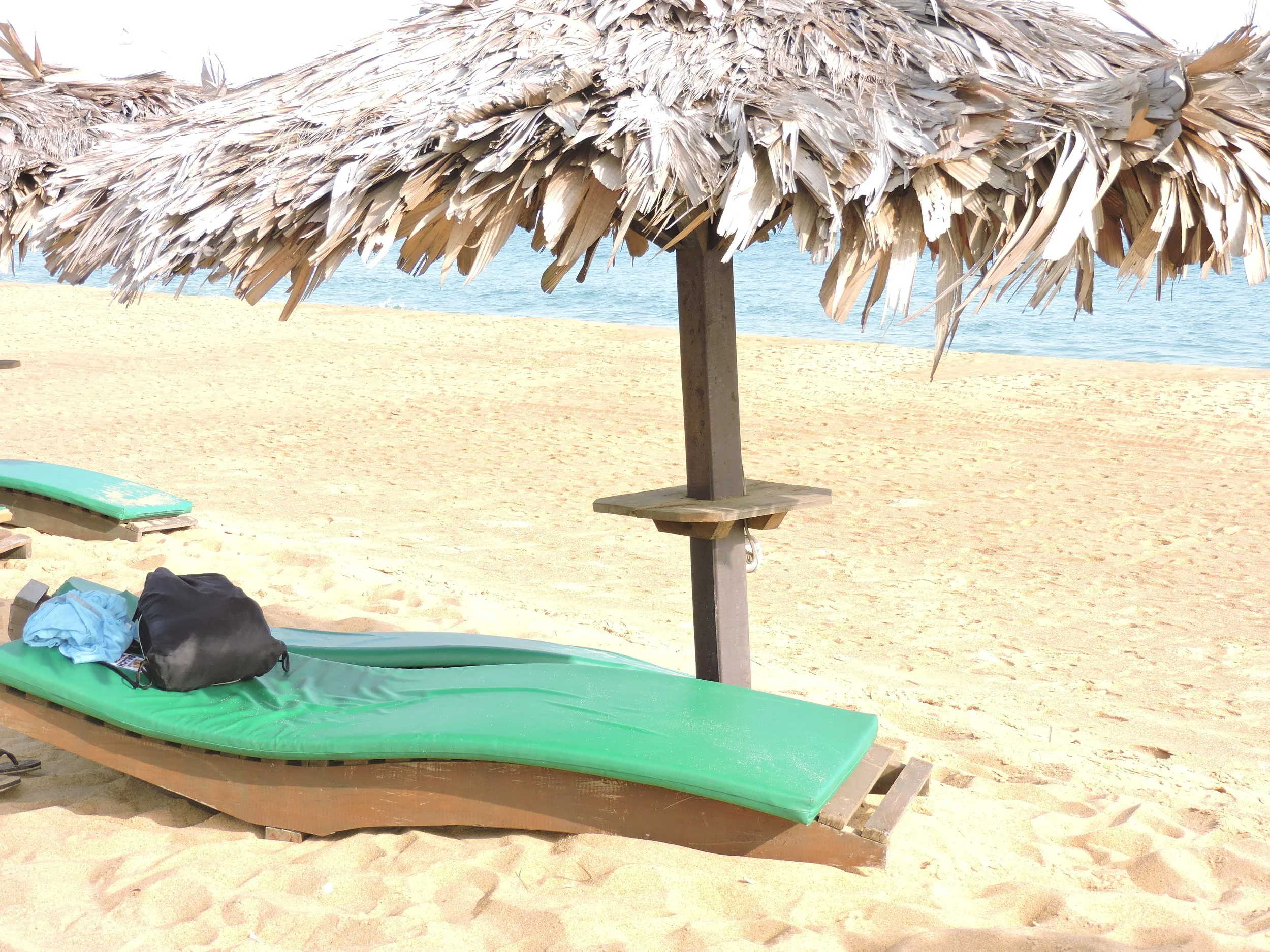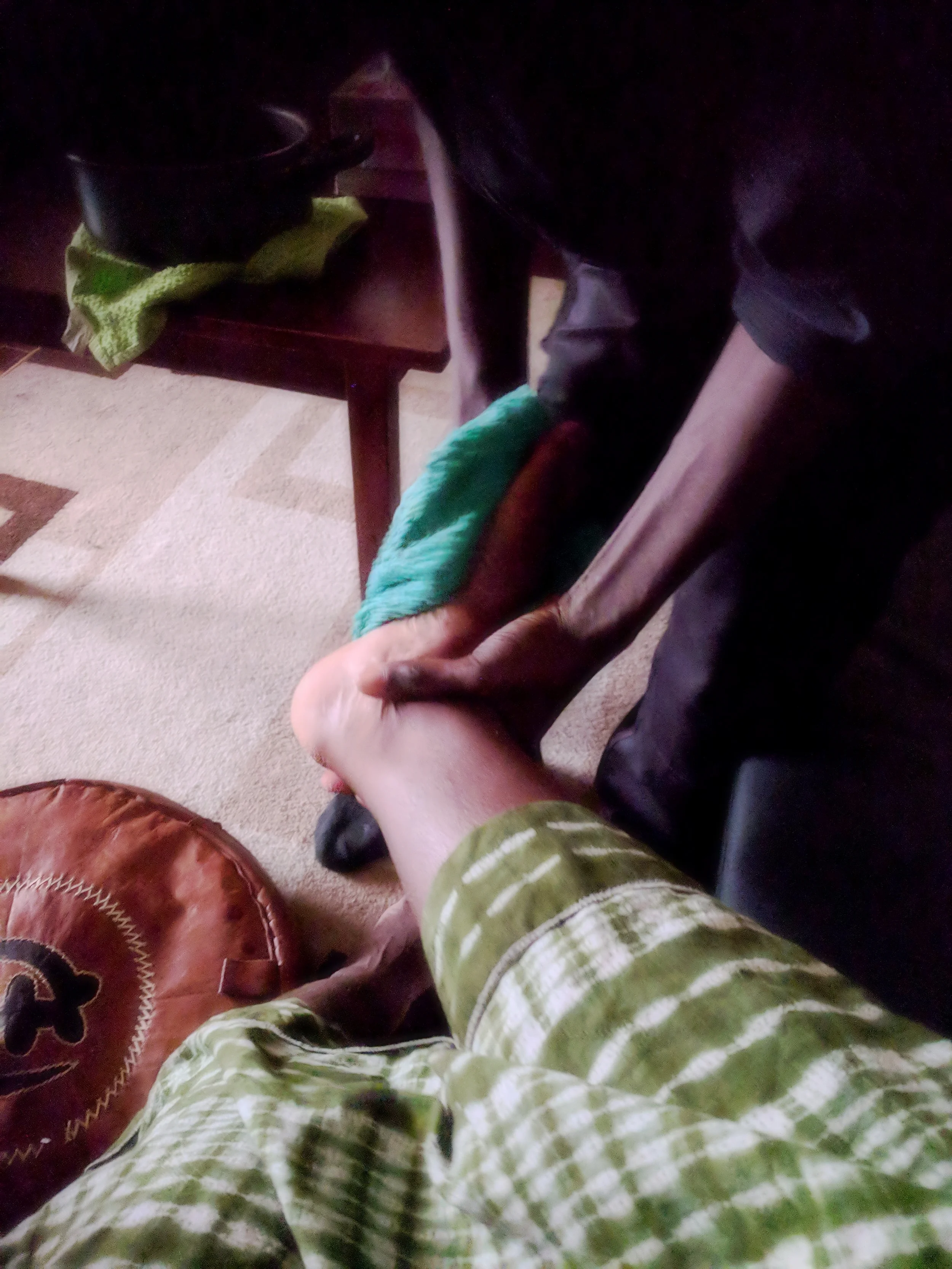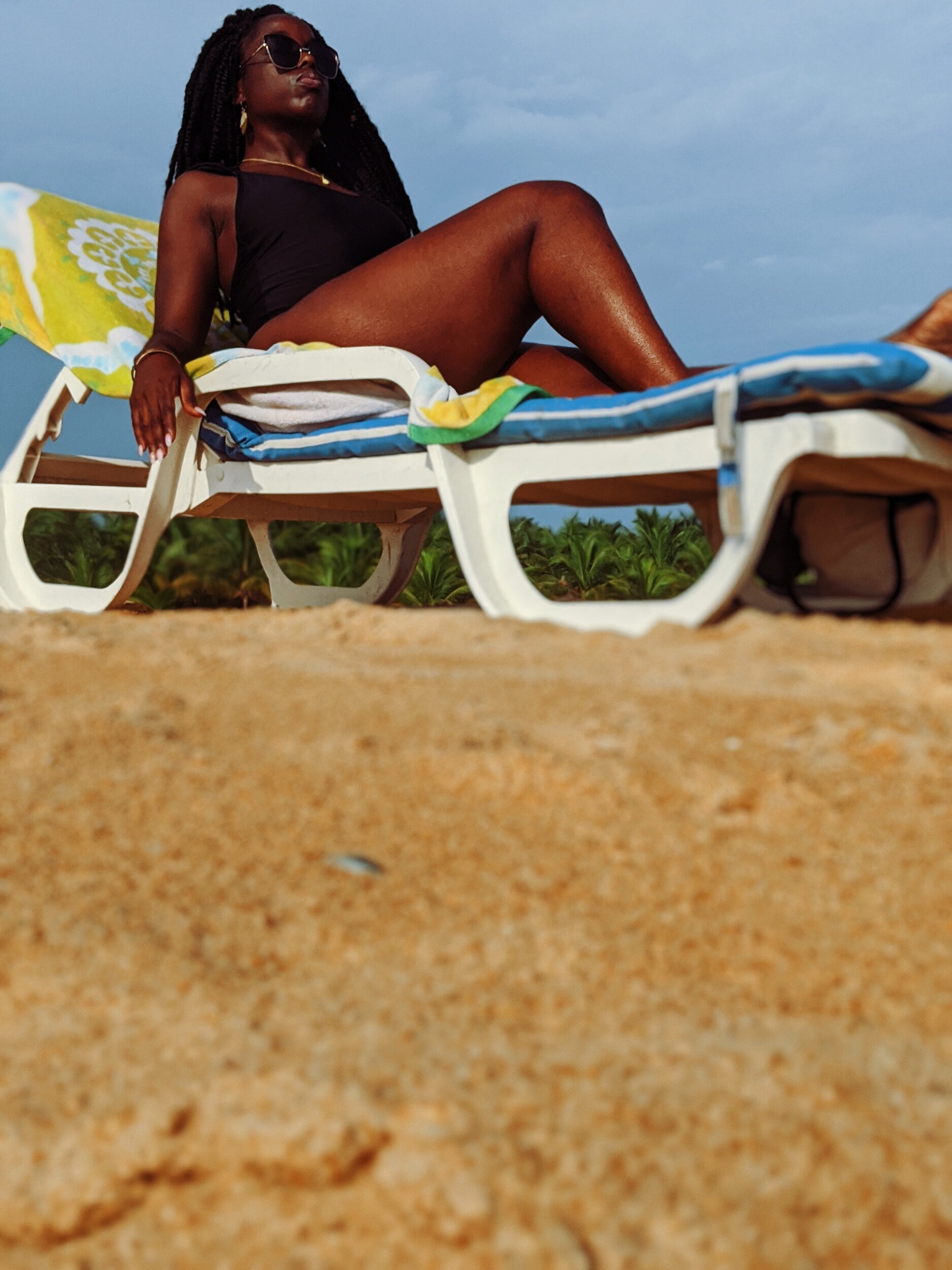Where Do We start counting?

Last night, I chose to bring in my 1st independence day in Liberia at a "Midnight Brunch". Exhausted, I was enticed by 1) wanting to support a Liberian owned and organized endeavor, 2) Having been tenuously hanging on to some semblance of a life outside of work for the past 5 weeks, and 3) It involved a film screening and discussion and food. The food was great. The film ok. The discussion? Ok. The musical performance & the dancing afterwards? Sublime. In fact, I could've guessed the night would be interesting when my favorite bottled beverage of choice was served before and during the screening of the film. I'm a Jungle Juice disciple and have been known to supermarket hop in search of this tasty and potent concoction.
The Vice documentary feature States of Undress: Clothing and Corruption in Liberia was a project I was excited to see after running into what appeared to be the Vice camera crew filming near a local eatery in December. I had heard that they were in town to film Monrovia Fashion week. At the restaurant I saw a designer I had personally supported since 2013, a young Liberian who had grown up in the states with a pile of clothing I had once waited a few months after an international order to get. I wished her well and considered going to support. I never made it but there was tons of buzz on social media about the event. Tons.
Fast forward to 7 months later and I no doubt, encouraged by the couple sips of Jungle Juice I had imbibed, decided to be the first to break the ice with my immediate thoughts on the documentary at an open forum. I noted that this was Vice's 2nd foray into a film about Liberia, the first leaving an extremely bad taste in everyone's mouth about Africa's oldest republic, my homeland. I noted being excited and proud at any moment Liberia is put on the map, so to speak, in people's psyche. For me this last point is especially poignant because I recall growing up wondering why after relentless marches to the UN, seeing images of piled up bodies at the US embassy in Monrovia, and hearing first-hand accounts from family members who had escaped the war, everyone seemed to know bits and pieces about this tiny parcel of land on the West African coast but no one cared to do anything about the crazy and seemingly senseless civil war that roiled on for all of my childhood and adolescence. I ended my brief recall of the Vice in Liberia relationship with the remark that this present documentary didn't leave as strong a taste of all the wrong things in my mouth but it nevertheless left me unsettled.
There were murmurs amongst the crowd and one person even asked me to expand but my job as I saw it was done, I wanted to open up the floor for discussion. It's always a little nerve grating when longer than 40 seconds goes by after a 2nd ask for folks to jumpstart the discussion and the timidity just hangs in the air like a floating bubble waiting to be popped.
I could have elaborated but was happy I didn't and allowed others to talk (over the unspecified limit that is acceptable in such forums) as I too, was curious as to how others received it. One attendee asked of one of Monrovia Fashion's Week's organizers "What did she feel was left out?" in the cutting and splicing that is media production and Vice's sensationalist delivery of the global world. I marinated on that a bit and have decided to expand on a few strains of thought below.
What left me unsettled was less the thought of the reductionist portrayal of the centuries old conflict between indigenous Liberians and resettled slaves and captured Africans as still prevalent today. I too, have noted some of this as I attempt to build a professional and social network for myself in my mother's homeland with the resources at my disposal in terms of cousins, aunts, and newly made friends and friends of friends and friends of friends of friends in high places. It's about who you know, and isn't this the case anywhere? What left me unsettled on the eve of independence was more than just the need to "own our own narrative" and/or the idea that we had perhaps transcended some of the inferences the Vice team so expertly wove into the 50 minute production on what I had originally thought was coverage of a "lifting Liberia through fashion" expose. I left feeling that a huge abyss still defined Liberia in 2017 and that abyss was filled with an eerily reminiscent divide based on these divisions between Congo & Native, characteristically African corruption, and as for the fashion, social uplift angle, I felt it was eclipsed by these underlying themes and I saw less fashion and more "X person discovers Liberia" for the first time.
What I felt was missing? A deeper historical treatment & perspective of how and why things are the way they are. As someone who loves history and used to be more of a history buff than I've recently allotted time to, I always wondered why the history of Liberia (when it is retold) always starts when those first slaves were resettled from America? How many Liberian students can discuss the history of the land before ACS. Like the history of America and even calling the US America is subtle and not so subtle erasure of "The Americas" (which comprise of 2 continents with a plethora of other countries), the Native Indians who inhabited this land, etc. While it's an easy historical catalyst that can be used to explain the country's modern-day woes, starting there, in my opinion does an injustice to the people whom that narrative seeks to understand. Liberians then and now inhabit a diverse land of 16 ethnic tribes and yes, a class/tribe of it's own when one considers the ACS. The vast majority of these people existed before the ACS venture onto the Western Coast of Africa. Starting the story with ACS and the replication of the southern American mental complexities associated with slavery in the motherland treats a large section of Liberians as Invisible Men so to speak. Ironically the racist ideologies that colored the ACS' (read: America's) involvement in Liberia for many years is also quickly glossed over. One attendee attempted to note some of the reductionism in explaining his disdain for the use of the term "Congo" and it's erasure of a section of the resettled population who never made it into American slavery at all. My point? While it's difficult to fully explore a layered and complex country narrative such as Liberia's, especially in a limited amount of time, the story of Liberia in relation to America, slaves and the racism exhibited in the country for years to come, it has been told the same way so many times I just wish if the objective of Vice was to tell this story, that it was told in a way that explored things we don't already know (not saying reinvent the story or even the angle but investigate something "new"). Reaching out to a larger cross section of Liberians to participate in the storyline? A discussion of some of these solutions being imagined to bridge this divide perhaps?
I'm afraid that it mattered less who was telling the story. I admit my own bias in this regard having been reared by a woman who's vantage point and real life lived experience of her country was living in the majority population and outside of the class who had the power. When prompted to tell our own story, many of us may also resort to the same dichotomy as illustrated in what I observed of last night's discussion.
History is told they say, from the lens of the storyteller. We bring our own biases to each tale. I guess I'm sick of us regurgitating the easily explicable, simplified version of things. It's akin to when I studied African Studies in college, my introductory courses were taught by an Italian man and I immediately had doubts. Yet we delved into a course called "Africa Before 1800" which I was grateful for before approaching "Africa after 1800" and subsequent topics. I acknowledge however that I still felt incomplete after completing the major and knew there was still much more self-guided learning necessary. I guess what I'm trying to say is, is that it depends on your objective, of which I'm unsure of the ultimate objective of the Vice Team that traveled to Monrovia this past December. Let's assume however their objective was to merely capture a holistic snapshot of where Liberia was 170 years after independence, 37 years after the coup that sought to equalize the playing field, and 12 years after peace in post-war Liberia. Well they did that. Where I'm left unsettled is in their attempt to narrate this dynamic. It was incomplete, reductionist, monotonous, and lazy in a canon of Liberia: America's Stepchild, Fail(ing) experiment, etc. Why did they seek the featured participants that they did? Entertaining? Maybe. Where I was no longer entertained was the point at which the history buff in me started to consider the complexity and diversity of the Liberians I've encountered in my lifetime and the Liberians I know through my family heritage, the incipient and persistent hand the great old USA has played in manipulating the interests of the nation and in turn the people, heck even the Berlin Conference of 1884 comes to my mind and is enervating when one thinks of the artificial boundaries put upon Africans in general. See? It's a complicated story and so if you've only got 50 minutes to tell one of the most interesting slices of that tale, I expect you to do a much better job at it than what those 50 minutes of ViceLand's Clothing and Corruption in Liberia offered me. I would have respected the work more if they told another tale altogether.
"Hailey Gates explores global fashion and issues the industry often ignores, showing us what the world wears, and why" is the tagline of the ViceLand special after all. I would have been more enthralled in a story that involved Hailey weaving through Waterside or Red Light market as I've done time and time again getting lost in the neverending, twisting tight curves of a second story clothing emporium. Visiting Ma Juah's market on the edge of Waterside for instance. Following Liberian young women around who have lived here their whole lives and discovering where they shop might have been a richer story. Liberian women of all classes have got style. A focus on that "something new" if you will. While I love the clothing of the designer I mentioned supporting earlier, I'd gather (huge assumption) that a majority of Liberian women cannot afford the prices in that shop. I applaud the effort in the provision of jobs, it's just the clothes are made for Western pockets and that's fine. I could barely afford them as a grad student 4 years ago just eager to support a young woman from my country! The fashion show itself lasted about 2 minutes or less of the documentary; I only recall one model being interviewed. So I went in with the expectation of discovering more about the clothing industry in Liberia and some of the social, gender, economic issues surrounding that. We heard the perspective of one former government contractee and met one Liberian tailor who caters predominantly to Western tastes and the story of a fashion show gone awry was the thread that wove it all together.
I felt in many ways not unlike one of the featured participants in the documentary alluded to, a tad misled. I came for a new story, a new dialogue, and some solutions and instead I got an added hand in stirring the pot. A pot we already knew was stirred and remains stirred. It just stopped boiling a few short years ago. It's time to eat and I got an attempt at explaining the recipe at the expense of a neglect for other ingredients in the stew, the process, and what the chefs brought to the table. It reinforced the simplistic view of the African cake that can simply be divided up for easier consumption by the West. Yet now we have the added fortune of having it forced down African throats...
My takeaway: Do Better. All of Us.
Happy 26, Wishing us Many More Years!




